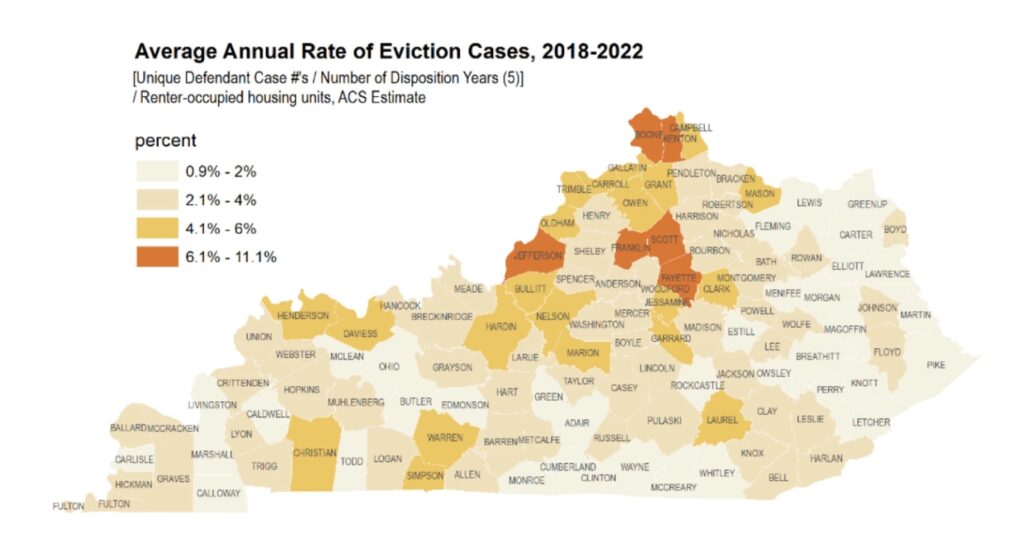Kentuckians living in rural communities are more likely to face a bad outcome during the eviction process compared to their urban counterparts, according to a new study.

Published in October, “Rural Renting: An Empirical Portrait of Eviction” looks at the eviction process from the renter’s perspective. Study authors Cassie Chambers Armstrong and CJ Ryan, are law professors at the University of Louisville and Indiana University Bloomington. They found that people in rural areas are 55% more likely to face a judgment of eviction once legal proceedings begin.
The study defined an urban county as any one having a population more than 125,000 people – a benchmark that only five of Kentucky’s 120 counties meet. Every county beneath that threshold is considered rural for the purposes of this study.
Armstrong, an eastern Kentucky native and a Democratic Kentucky state senator from Louisville, said this issue matters when Kentuckians face housing insecurity or homelessness.
“We’re talking about folks who are losing their homes. We’re talking about the kids who are experiencing housing instability,” Armstrong said. “It matters that we understand this issue, and that we understand what we can do to help support folks who are going through this process.”
The study identified some of the challenges facing rural Kentuckians when it comes to evictions. Those include the fact that many housing nonprofits are based in urban areas, that people living in rural communities are less likely to be covered by programs like right-to-counsel laws and a lack in the availability of transportation to court and even legal representation in rural areas.
The Kentucky Housing Corporation invests in affordable housing solutions by offering programs and services throughout the Commonwealth, including an eviction diversion program.
Christine Amburgey manages that program for the KHC. She says that the eviction process moves very quickly through the legal system and that it focuses on whether the landlord has the right to possess their property – not the stressors impacting the tenant.
“It’s a set out process where, once that ruling is made in court, the sheriff can come out, and they will set the tenant and all their belongings on the street,” Amburgey said.
Amburgey says that being evicted can make finding rental housing in the future more difficult for tenants, especially considering the general shortage of affordable rental units in Kentucky. KHC data indicates a need for more 206,000 for-sale and rental properties across the Commonwealth – with more than 100,000 of those needed units being rentals.
“The scarcity of affordable housing in rural Kentucky, you know, compounds this concern and often leaves tenants with very few options if they are evicted.”
Tenants facing eviction already face financial hardships heading into arbitration. The financial strain of the process – usually coupled with an inability to pay rent – can lead to tenants not hiring legal representation or avoiding court and pursuing a self-eviction process instead.
“Tenants aren’t aware of their rights, and they aren’t aware of how to access legal aid services,” Amburgey said. “They just can’t afford those costs.”
Armstrong said mediation and right-to-counsel programs are mainly found in urban areas, something she hopes will change in the future.
For those facing a court-ordered eviction, the Eviction Diversion Program can pay past-due rent and future and provide emergency relocation vouchers for those who qualify and apply.
This story is republished with permission from WKMS. Read the original.
Zoe Lewis is a first-year sophomore at Murray State University from Benton, Kentucky. She is majoring in journalism with a minor in media production. She enjoys reading, going to movie theaters, spending time with her family and friends, and eating good food. Zoe is an Alpha Omicron Pi sorority member in the Delta Omega chapter. She is very excited to start working at WKMS and work while learning more about NPR, reporting, journalism, and broadcasting.






